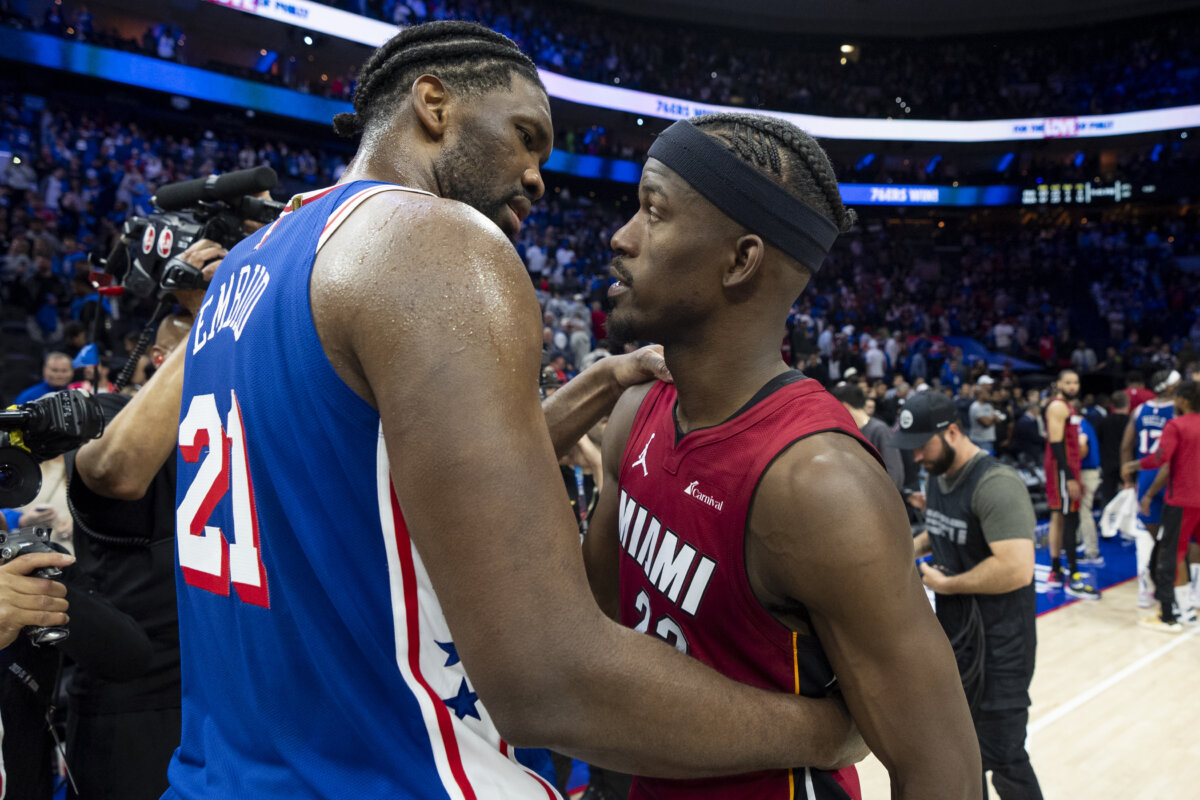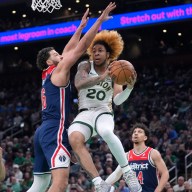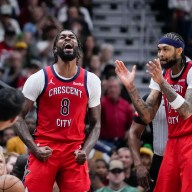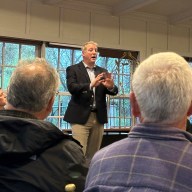 Kathleen Turner and Michael Douglas play marrieds literally at each other’s throats in “The War of the Roses.”
Kathleen Turner and Michael Douglas play marrieds literally at each other’s throats in “The War of the Roses.”
Credit: Provided
It’s Valentine’s Day, which doesn’t mean you need to torture yourself with a film affirming the power of love. Instead, snuggle up with one that speaks to the other extreme: that love can die, that you may never find your soulmate, that relationships can be a battle between who can torture the other the most. Here are some anti-romances to warm your heart during that chilliest of Hallmark holidays.
 Katharine Hepburn and Cary Grant fend off a leopard in “Bringing Up Baby.”
Katharine Hepburn and Cary Grant fend off a leopard in “Bringing Up Baby.”
Credit: Provided
‘Bringing Up Baby’ (1938)
Screwball comedies try to be too cool for school, taking little seriously. But when it comes to amour, most can’t help but end with lovers united (or reunited). Howard Hawks’ signature entry does not. It’s about undesired affection. Cary Grant’s bumbling paleontologist wants nothing to do with borderline-sociopathic society girl Katharine Hepburn, who locks onto him and destroys his life, one ridiculous hairpin plot twist at a time. They get together in the end, but only after Grant has finally and utterly given up all hope for happiness.
 Rhett Butler (Clark Gable) bids Scarlett O’Hara (Vivien Leigh) farewell in “Gone With the Wind.”
Rhett Butler (Clark Gable) bids Scarlett O’Hara (Vivien Leigh) farewell in “Gone With the Wind.”
Credit: Warner Home Entertainment
‘Gone With the Wind’ (1939)
Deplorable ode to the South rising again or the artistic pinnacle of the Hollywood studio system? It’s both — and it’s also one of the great anti-romances. Shot down by Ashley Wilkes (Leslie Howard), Scarlett O’Hara (Vivien Leigh) instead toys with the affections of dashing ladies man Rhett Butler (Clark Gable). After 3 ¾ hours of being jerked around he’s finally had enough. His weary kiss-off — “Frankly, my dear, I don’t give a damn” — has been replayed till it barely has any meaning, but it’s truly one of the most badass eff-yous in the movies.
 Catherine Deneuve and Nino Castelnuovo sing to each other in “The Umbrellas of Cherbourg.”
Catherine Deneuve and Nino Castelnuovo sing to each other in “The Umbrellas of Cherbourg.”
Credit: Provided
‘The Umbrellas of Cherbourg’ (1964)
Few onscreen couples have been as in love as Catherine Deneuve and Nino Castelnuovo are in Jacques Demy’s candy-colored, all-sung French musical. But they only get to be together for the first half hour. The remainder details their forced separation. They’re reunited in the final scene, but too much time has passed. They’re both married with kids. They make idle chit-chat. Then they move on. Only the music remembers what once was. Love fades, but so, perhaps worst of all, does heartbreak. Humans have this irksome habit of getting over things.
 Jean-Paul Belmondo and Anna Karina play lovers who won’t last in Jean-Luc Godard’s “Pierrot Le Fou.”
Jean-Paul Belmondo and Anna Karina play lovers who won’t last in Jean-Luc Godard’s “Pierrot Le Fou.”
Credit: Provided
‘Pierrot le Fou’ (1965)/‘L’Amour Fou (1968)
Cinema is lousy with filmmakers making films with their paramours, sometimes to the exasperation of viewers, who may not get what they see in each other. But it’s easy to get what director Jean-Luc Godard saw in his alluring, enthusiastic one-time wife Anna Karina. Their marriage burned brief and hot. “Pierrot le Fou” was made mid-breakup, and it sketches — in absurdist, delirious, primary color-heavy ways — the towering hills and bottomless valleys of a couple (Karina and Jean-Paul Belmondo) that could never last. Later, fellow French New Waver Jacques Rivette made “L’Amour Fou,” his own four-hour version of the Godard-Karina story, with a theater director mounting a play while he and his wife messily split.
 Albert Finney and Audrey Hepburn play bickering marrieds in “Two for the Road.”
Albert Finney and Audrey Hepburn play bickering marrieds in “Two for the Road.”
Credit: Provided
‘Two for the Road’ (1967)
So you survived the dating scene and got married. Congrats! You’re not in the clear yet. You never are. In fact, the person you wed may have been a compromise. You may spend the rest of your life arguing but never splitting — because you have kids, because you share a life, because you don’t think you can do any better. These are some of the worries raised, frankly and often funnily, in Stanley Donen’s dramedy, which jumps all around the timeline of marrieds Audrey Hepburn and Albert Finney. He wanted Jacqueline Bisset (as we all do), but he “settled” for Hepburn. They do love eachother, but it’s a rocky road — a neverending wobble between fights and make-ups, over and over again. That’s marriage and that’s life.
 Marlene Jobert and Jean Yanne won’t grow old together in “We Won’t Grow Old Together.”
Marlene Jobert and Jean Yanne won’t grow old together in “We Won’t Grow Old Together.”
Credit: Provided
‘We Won’t Grow Old Together’ (1972)
Best. Title. Ever. In Maurice Pialat’s unforgiving, powerfully unsentimental drama, we see the last throes of the union between a miserable, forty-something filmmaker (Jean Yanne) and his much younger girlfriend (Marlene Jobert, Eva Green’s mom). Perhaps once he was alluring, but his career has stagnated and he’s become an emotionally abusive cad who’s gotten too used to having an understanding, weak-willed paramour. (His “pet name” for her appears to be “rat.”) It’s an insightful examination of mutual neediness, but don’t worry: As the title promises, all works out well.
 Kathryn Harrold and Albert Brooks split up —for the first time, of many —in “Modern Romance.”
Kathryn Harrold and Albert Brooks split up —for the first time, of many —in “Modern Romance.”
Credit: Provided
‘Modern Romance’ (1981)
Albert Brooks is Woody Allen if Woody Allen didn’t love himself. The “Albert Brooks” character (at least early on) is a self-absorbed monster who targets mates the way a cat does a mouse. His second directorial feature begins with his Hollywood editor breaking up with his girlfriend (Kathryn Harrold). He immediately regrets this, then spends half the movie trying to win her back. Once she relents, he instantly suspects her of infidelity. The key scene finds him picking up a date — which he made while on ‘ludes — blabbing to her about how he just got out of a breakup, putting her in his car, hearing “She’s Out of My Life” on the radio and then, distraught by Michael Jackson, driving her immediately home, telling this innocent, confused woman that he’s dating too soon. It’s the world’s greatest, saddest two-minute date.Though a comedy, and a very funny one, it’s the darkest kind, one beloved by no less a warm-hearted soul than Stanley Kubrick.
 Gary Oldman and Alfred Molina enjoy a terrible relationship in “Prick Up Your Ears.”
Gary Oldman and Alfred Molina enjoy a terrible relationship in “Prick Up Your Ears.”
Credit: Provided
‘Prick Up Your Ears’ (1987)
A small sub-phylum exists of films about bad gay relationships — ones that never should have been and tend to end horribly (or weirdly). “Behind the Candelabra” features a boy toy (Matt Damon) who agrees to plastic surgery to make him look more like his lover, Liberace (Michael Douglas). He got off easy: playwright Joe Orton (Gary Oldman) got a hammer to the head after mentally torturing the hell out of his socially awkward boyfriend (Alfred Molina). Ain’t love grand?
 Kathleen Turner and Michael Douglas fight to the bitter end in “The War of the Roses.”
Kathleen Turner and Michael Douglas fight to the bitter end in “The War of the Roses.”
Credit: Provided
‘The War of the Roses’ (1989)
There are lots of movies where couples go from the height of amour to outright hatred, but only one where they bust out weapons and fight to the death inside a darkened mansion. Director Danny DeVito — whatever happened to that phrase? — never softens up, not even in the final moment, when it seems rich suburbanites-turned-psychopaths Michael Douglas (the king of bad relationship movies) and Kathleen Turner might have a change of heart. They don’t. And that’s even better than the part where she runs over his Morgan 4/4 with a monster truck.
 In “She-Devil,” Meryl Streep and Roseanne Barr fight over … Ed Begley Jr.? That can’t be right.
In “She-Devil,” Meryl Streep and Roseanne Barr fight over … Ed Begley Jr.? That can’t be right.
Credit: Provided
‘She-Devil’ (1989)
Likewise, there are lots of movies about jilted lovers (“Diary of a Mad Black Woman” springs to mind), but too few where the wronged party plots an elaborate revenge then gradually and patiently sees it through to the bitter end. Justifiably peeved that her husband (Ed Begley Jr.) has run off with a beautiful woman who looks like 1989-era Meryl Streep (Meryl Streep), a portly housewife (Roseanne Barr) plays a long con that slowly unravels every piece of her ex’s new, splashier life. Wait: They’re fighting over Ed Begley Jr.?
 Kate Winslet and Jim Carrey relive happier days in “Eternal Sunshine of the Spotless Mind.”
Kate Winslet and Jim Carrey relive happier days in “Eternal Sunshine of the Spotless Mind.”
Credit: Provided
‘Eternal Sunshine of the Spotless Mind’ (2004)
Oh, if we could erase the bad memories of a failed relationship, as Jim Carrey’s sadsack does in Charlie Kaufman and Michel Gondry’s manic breakup fantasy. Crippled after his relationship with free-spirit alkie Kate Winslet ends horribly, he finds that his solution only makes him long for the good times that are being zapped from his brain along with the bad. As Woody Allen concluded in “Annie Hall,” we repeatedly put ourselves through the often atrocious and upsetting process of dating because “we need the eggs.” If only we didn’t.
 Vince Vaughn and Jennifer Aniston actually do break up in “The Break-Up.”
Vince Vaughn and Jennifer Aniston actually do break up in “The Break-Up.”
Credit: Provided
‘The Break-Up’ (2006)
Spoiler: In a movie called “The Break-Up,” two attractive Hollywood stars (Jennifer Aniston and Vince Vaughn) actually break up. It’s a low-stakes, improv-heavy “The War of the Roses,” with both parties refusing to leave the swank Chicago apartment they scored together but picking at each other in mostly harmless ways. But don’t underestimate a high-profile comedy that doesn’t wuss out on the sad stuff — although it’s best to ignore the tacked-on “a few months later” coda that cheaply promises a glimmer of hope.
 Joseph Gordon-Levitt imagines he and Zooey Deschanel having the relationship they never had in “(500) Days of Summer.”
Joseph Gordon-Levitt imagines he and Zooey Deschanel having the relationship they never had in “(500) Days of Summer.”
Credit: Provided
‘(500) Days of Summer’ (2009)
One. Of the Most. Annoying. Titles. Ever. Actually, there’s a lot that’s annoying about this anti-rom-com, from the over-pluckiness of the direction to the young white male privilege to Joseph Gordon-Levitt’s precocious, advice-dispensing little sister (Chloe Grace Moretz). But it’s the rare film about unrequited love that acknowledges that the person suffering from it should suck it up and move on.
 Lars Eidinger and Brigit Minichmayr take a vacation in “Everyone Else.”
Lars Eidinger and Brigit Minichmayr take a vacation in “Everyone Else.”
Credit: Provided
‘Everyone Else’
The couple in Maren Ade’s German great — played by Brigit Minichmayr and Lars Eidinger — aren’t a bad couple. They don’t fight and, best of all, they aren’t corny. But, Ade’s film suggests, that might be the problem. They think they’re above it all; they’re not like everyone else, like every other couple. But that in itself is a form of delusion. They’ve become passive-aggressive, unable to communicate honestly, and they don’t seem to realize they might not really be suited for eachother. That tension fuels one of the most insightful looks at the power plays that bubble under the surface of relationships, bad ones and good.
 Ryan Gosling and Michelle Williams fall in love —then bust up horribly —in “Blue Valentine.”
Ryan Gosling and Michelle Williams fall in love —then bust up horribly —in “Blue Valentine.”
Credit: Provided
‘Blue Valentine’ (2010)
First they’re falling in love. Then they’re breaking up. Then they’re having hot sex for the first time. Then they’re having crap sex, probably for the last time, in a weird hotel room. Back and forth, over and over again, goes this look at a couple (Michelle Williams and Ryan Gosling), whose romance doesn’t go the full mile. It’s easy — it’s really, really easy — but damned if the structure doesn’t hurt gangbusters anyway.
 Adele Exarchopoulos and Lea Seydoux fall in love before they fall out of it in “Blue is the Warmest Color.”
Adele Exarchopoulos and Lea Seydoux fall in love before they fall out of it in “Blue is the Warmest Color.”
Credit: IFC Films
‘Blue Is the Warmest Color’ (2013)
What is it with that color? On one hand, this is yet another look at the life of a relationship. On the other, this is the rare couples saga where the passion isn’t equal. For Adele (Adele Exarchopoulos), her stint with blue-haired artist Emma (Lea Seydoux) is her first big one. It nails the abandon of the new, but it’s even sharper at capturing the fall-out, when Emma dumps Adele (for a good reason, mind), then has the nerve to not only move on, but find someone better and more mature. What was major for Adele was, for Emma, a glorifed footnote. Love, as Def Leppard says, bites.
Note to New Yorkers: Both “We Won’t Grow Old Together” and “Modern Romance” (as well as “Possession,” the 1981 nutso divorce saga with Sam Neill and Isabelle Adjani, in which the latter leaves the former to share a bed with a…um…thing) will screen Valentine’s Day weekend as part of Anthology Film Archvies’ now apparently annual “Valentine’s Day Massacre.” For details go here.
Follow Matt Prigge on Twitter @mattprigge
















